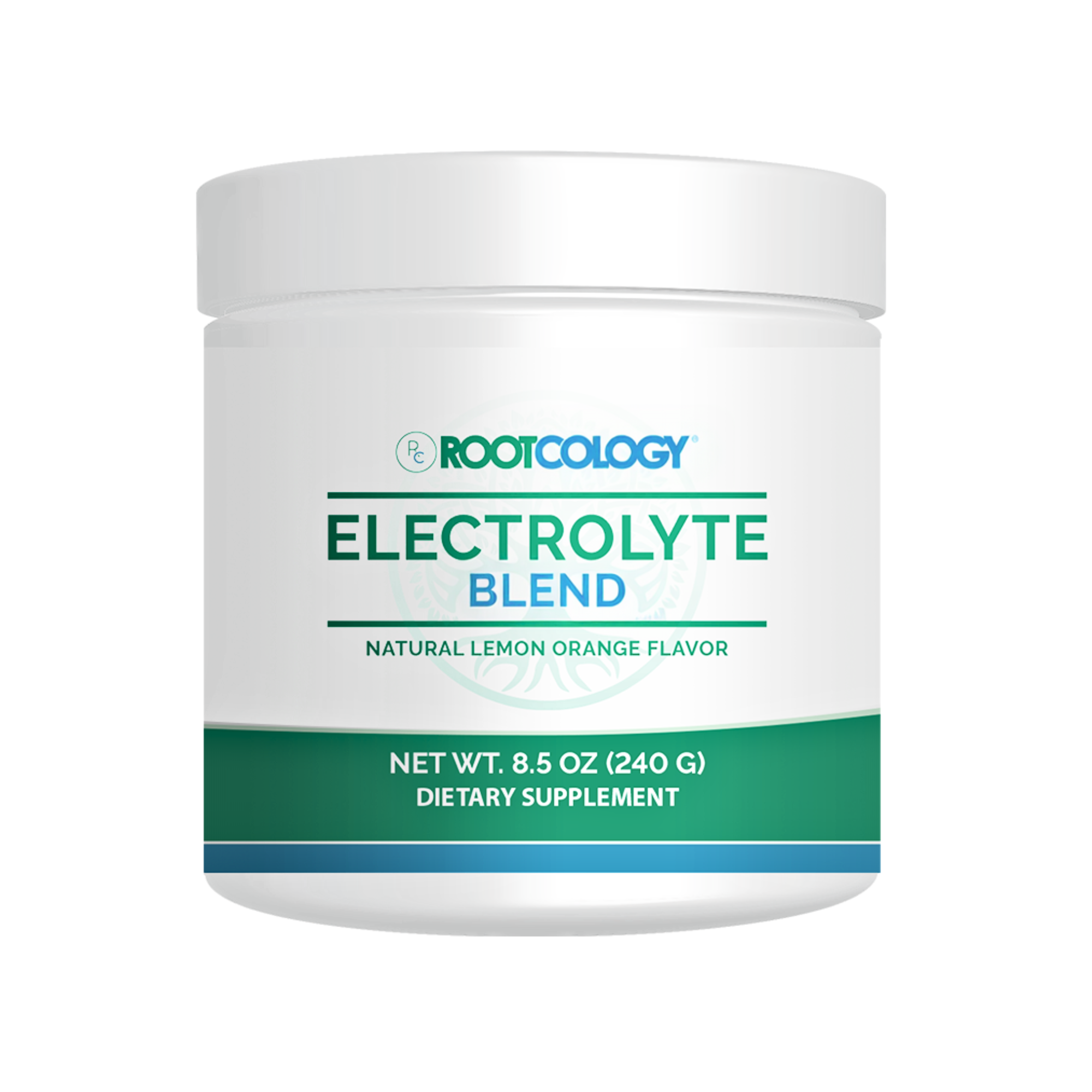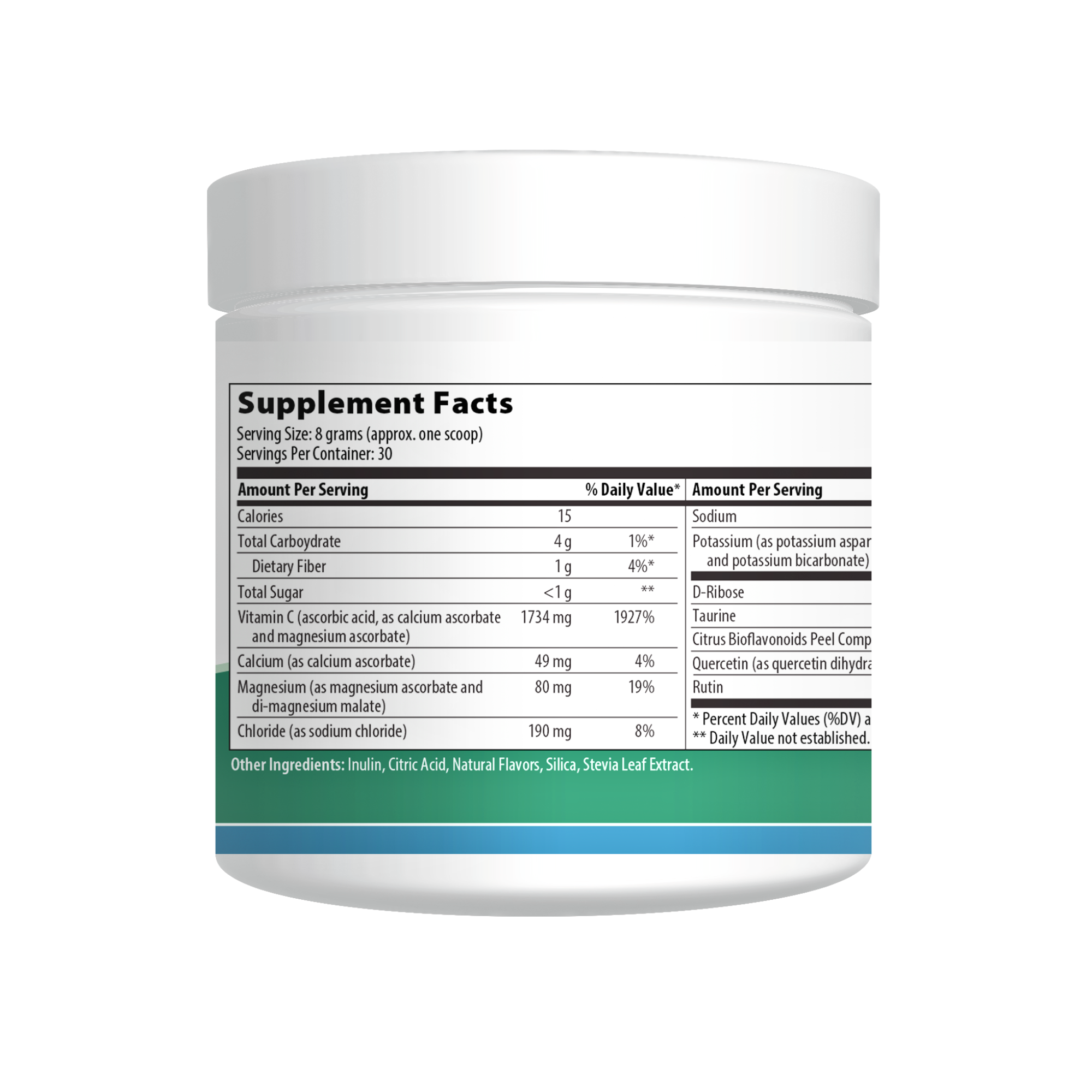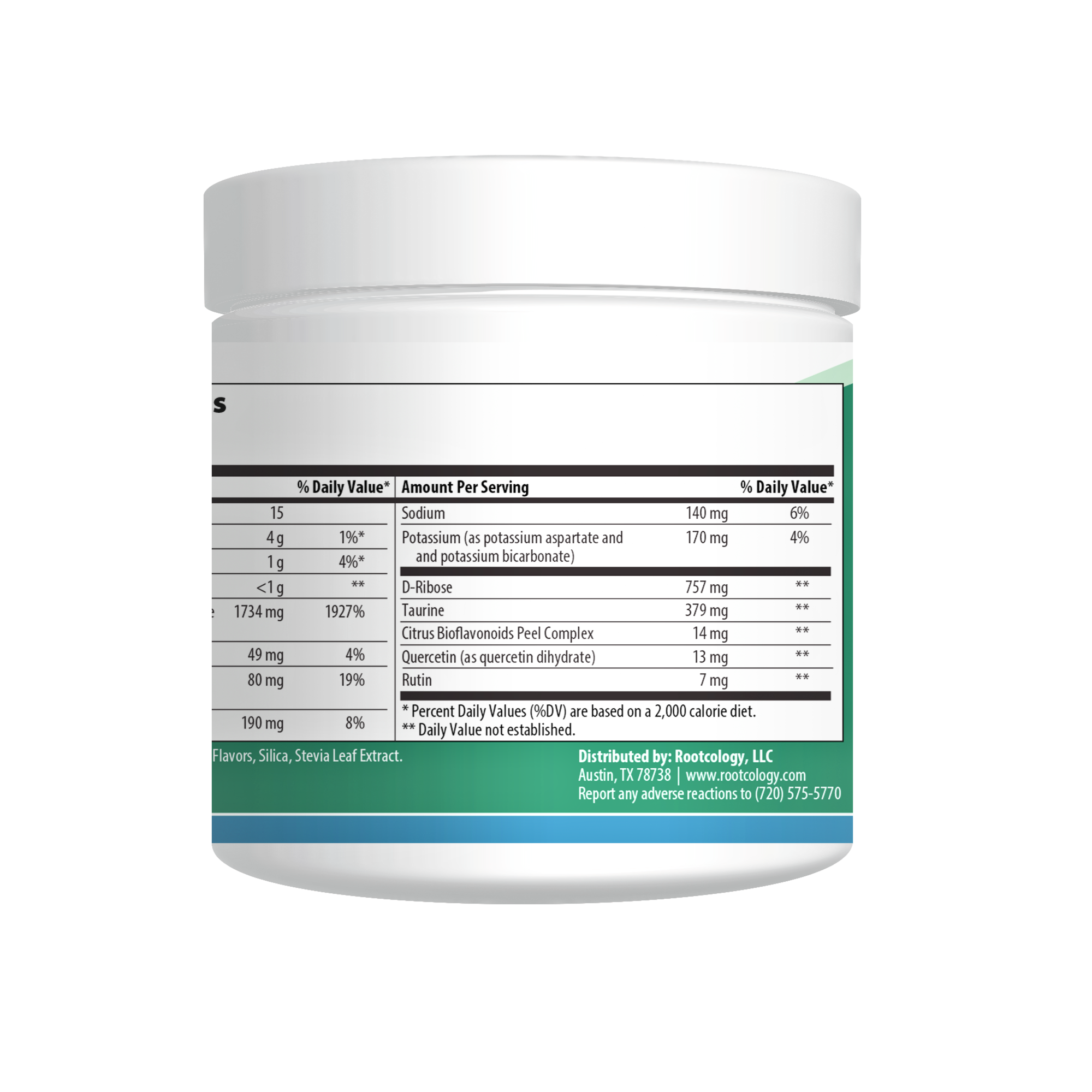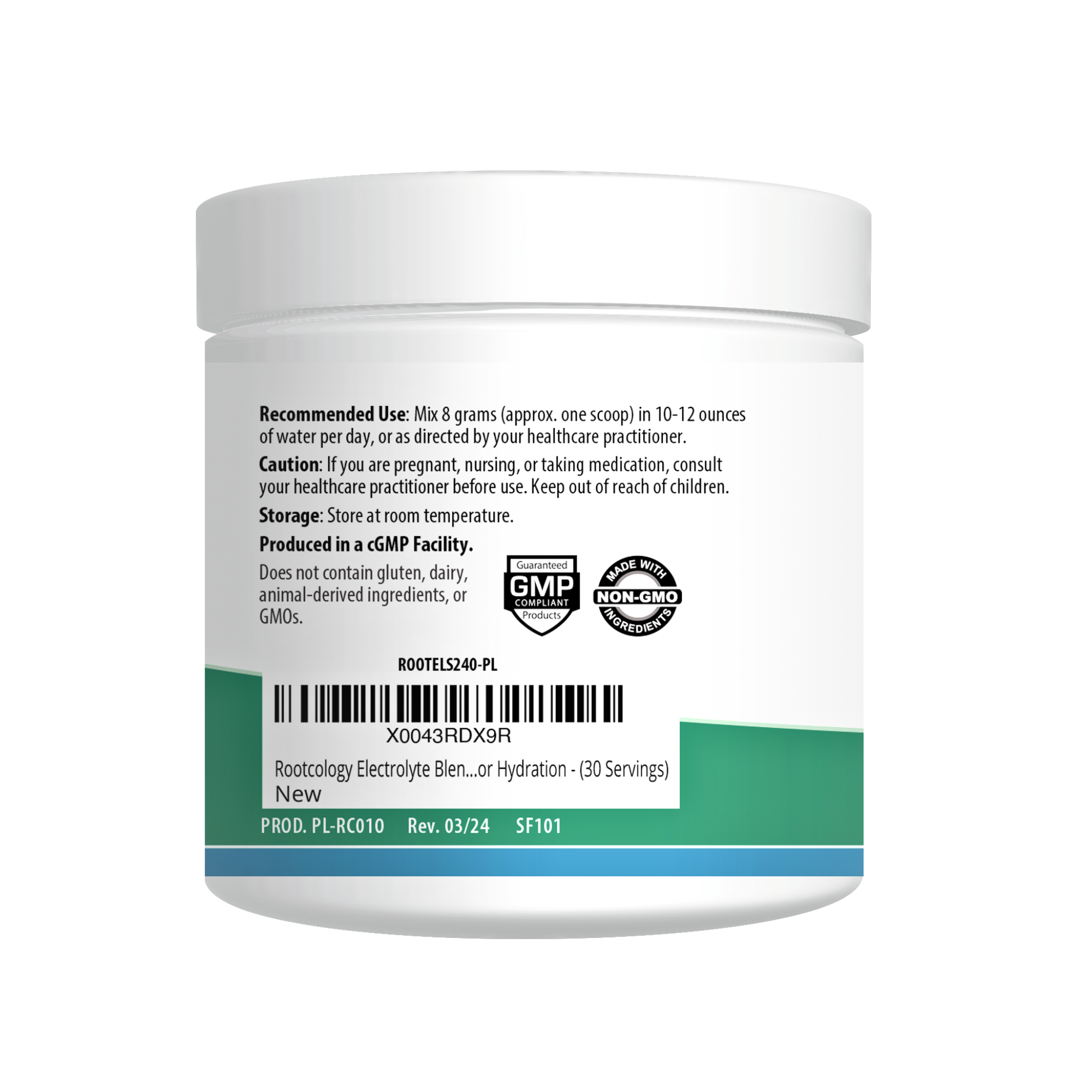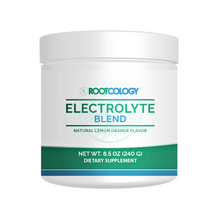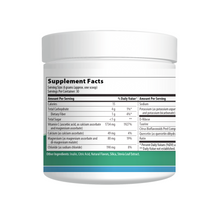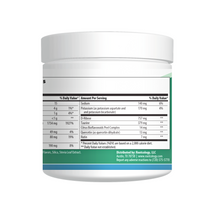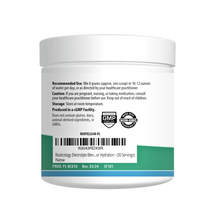What is Electrolyte Blend?
Electrolyte Blend is a well-balanced formula that includes the electrolytes sodium, potassium, calcium, magnesium, and chloride, which may contribute to maintaining normal hydration levels. It also includes ingredients such as D-ribose, taurine, vitamin C, quercetin, and citrus bioflavonoids, which play a role in supporting normal electrolyte function, maintaining normal energy production, and aiding in exercise recovery.*
What are the benefits of Electrolyte Blend?
Electrolyte Blend may be beneficial for replenishing electrolytes lost after occasional diarrhea, vomiting, or sweating, replenishing electrolytes lost during intense exercise, supporting healthy energy levels, maintaining healthy blood pressure already within the normal range, maintaining normal fluid balance in tissues, and support during periods of occasional stress.*
What is the recommended dose?
Eight grams (approximately 1 scoop) per day, in 10-12 ounces of water, is recommended.
How should I take it?
Mix Electrolyte Blend with water or any other beverage of your choice. It can even be made into popsicles for a fun hydrating treat.
How long can I take Electrolyte Blend for?
Taking Electrolyte Blend for 3 months to 2 years is recommended.
I read that magnesium needs to be separated by 4 hours from thyroid medications, but that this supplement (which contains magnesium) can be taken within 1 hour of thyroid medications. Can it be taken with thyroid medication?
The mechanism of interaction between magnesium and thyroid medication seems to be based on reducing stomach acidity. The high content of vitamin C and the forms of magnesium (malate and ascorbate) in Electrolyte Blend tend to increase acidity, which will likely counteract any stomach acid reducing capabilities of the small amount of magnesium contained within the blend.
As such, people may see increased absorption of thyroid medication with this blend, and spacing Electrolyte Blend 1 hour away from thyroid medication is generally recommended. However, those that believe the blend may be interfering with their thyroid medication absorption should separate the Electrolyte Blend 4 hours from their thyroid medication. Those taking Tirosint are less likely to experience absorption issues, due to the Tirosint formulation.*
What is the importance of electrolytes?
Simply put, electrolytes are minerals that play a critical role in the body. Through a biochemical process, electrolytes become ions (an atom or molecule with an electrical charge) that can conduct electrical signals in the body. These signals create communication and function within nerves and muscles, as the electrolytes move in or out of cells. Electrolytes are important for fluid balance, muscle contraction and blood pressure, and play other roles in the body as well.
How do I know if I have low electrolyte levels?
Electrolytes are often measured as part of routine annual lab work with your primary care provider, but you can certainly request these labs more often. If your blood levels of sodium, potassium, or calcium are out of the normal lab range, this would signal an electrolyte imbalance. This is the main way that conventional medicine looks at electrolytes.
What if my electrolyte levels are normal but I still feel like I could use Electrolyte Blend?
It is possible to have low levels of certain electrolytes, or an imbalance of electrolytes that is less severe, but still affecting your thyroid health. After all, the body, which needs pretty tight control of electrolytes in the blood, may prioritize electrolytes and concentrate them in certain areas when there is a deficiency somewhere. If you experience a collection of these symptoms, you may wish to experiment with increasing your intake of electrolytes, to see if that helps to improve your symptoms.
Symptoms of electrolyte imbalance, Hashimoto’s, and adrenal imbalance can all overlap to some degree. Here are some common symptoms to look for: fatigue (even after a good night’s sleep), salt cravings, low blood pressure, feeling faint with standing, brain fog, low blood sugar, hitting the snooze button, feeling “wired, but tired”, mild depression, decreased resilience to stress, headaches, muscle aches or cramps, diarrhea or constipation, frequent urination (including drinking water and feeling the urge to urinate right away), fast or irregular heartbeat, increased thirst, anxiety, and dry skin or lips.
Not to be used by those with a corn allergy. Electrolyte supplements may not be recommended for those with sodium-sensitive hypertension, those with a pacemaker, and those with high sodium or potassium levels. Do not use if you are allergic or sensitive to any of the ingredients in this supplement.
Consult with a doctor before use if pregnant or breastfeeding.
DO NOT TAKE if taking the following medications: ACE inhibitors, aminoglycoside antibiotics, anticoagulant/antiplatelet drugs, antihypertensive drugs, antidiabetic drugs, angiotensin receptor blockers, antacids, bisphosphonates, blood thinners, calcium channel blockers, corticosteroids, didanosine, digoxin, insulin, levodopa/carbidopa, lithium, potassium-sparing diuretics, quinolone antibiotics, skeletal muscle relaxants, sodium phosphates, sulfonylureas, tetracycline antibiotics, tolvaptan, and/or warfarin.
Please note: Electrolyte Blend uses non-GMO corn-derived ingredients and may contain a protein component that could cause an allergic response in those with corn allergies.
- Jubiz W, Ramirez M. Effect of vitamin C on the absorption of levothyroxine in patients with hypothyroidism and gastritis. J Clin Endocrinol Metab. 2014;99(6):E1031-E1034. doi:10.1210/jc.2013-4360
- Ybarra J, Fernandez S. Rapid and reversible alterations in thyroid function tests in dehydrated patients. Nurs Clin North Am. 2007;42(1):127-34.
- Hemantha Kumara DS, Muralidhara Krishna CS, Vishwanath HL. The electrolytes imbalance between hypothyroidism and hyperthyroidism. International Journal of Current Research. 2016;8(5):31031-31033.
- Schwarz C, Leichtle AB, Arampatzis S, Fiedler GM, Zimmermann H, Exadaktylos AK, Lindner G. Thyroid function and serum electrolytes: does an association really exist? Swiss Med Wkly. 2012;142:w13669. Doi: 10.4414/smw.2012.13669
- Tsigos C, Chrousos GP. Hypothalamic-pituitary-adrenal axis, neuroendocrine factors and stress. J Psychosom Res. 2002;53(4):865-71.
- Murgod R, Soans G. Changes in Electrolyte and Lipid Profile in Hypothyroidism. International Journal of Life Sciences & Pharma Research. ISSN 2250-0480 Vol 2. Issue 3. Jul-Sept 2012.
- Kaur J, Ahmad N, Gupta A. Changes in the Electrolyte Profile of Patients having Hypothyroidism. Journal of Medical Science and Clinical Research. ISSN (e)-2347-176x Volume 2. Issue 4. Page 633-637. April 2014.
- Abebe N, Kebede T, Wolde M. Assessment of renal function and electrolytes in patients with thyroid dysfunction in Addis Ababa, Ethiopia: a cross sectional study. Pan Afr Med J. 2016;24:338. Published 2016 Aug 31. doi:10.11604/pamj.2016.24.338.8455
- Mansourian AR. A Literature Review on the Adverse Effects of Hypothyroidism on Kidney Function. Pak J Biol Sci. DOI: 10.3923/pjbs.2012.709.719
- Krishna MCS, Kumara HDS, Vishwanath HL, et al. Study on The Electrolytes And Hypothyroidism – A Case Control Study. Biochem Ind J. 208;12(2):131.
- Natural Medicines Therapeutic Research Collaboration. https://naturalmedicines.therapeuticresearch.com/. Accessed August 5, 2020.
You May Also Like
Questions about Rootcology Products? Email info@rootcology.com and we will get back to you within 24 business hours.




